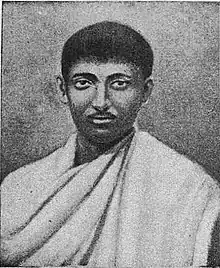Anantahari Mitra | |
|---|---|
 | |
| Born | 1906 |
| Died | September 28, 1926 (aged 19–20) Alipore Jail, Kolkata, British India |
| Occupation | Indian independence movement activist |
| Criminal charges | Killing of Bhupen Chatterjee |
| Criminal penalty | Sentenced to death |
Anantahari Mitra (1906 – September 28, 1926) was a Bengali Indian independence movement activist.
Early life
Anantahari, the son of Ramlal Mitra, was born in Baaganchra village, Shantipur, Nadia District in British India.[1] He received a student scholarship and went to Chattagram. After his Matriculation from Mymensingh, he shifted to Bangabasi College, Calcutta, for further studies.[2][3]
Revolutionary activities
In the wake of the Non-cooperation movement, Anantahari left his studies and became a whole-time Congress worker, spinning Charkha, weaving and selling khaddar, and agitating for the boycott of foreign goods. After that Mitra, met with nationalist revolutionary poet Bijaylal Chattopadhyay and came to Krishnanagar, Nadia where he met with leaders of the Indian National Congress.[2] In 1924, Mitra actively took part in revolutionary freedom struggle and left for Daksineswar. Police raided his residence at Daksineswar on 10 November 1925 and arrested Mitra along with other activists. He was sent to prison in 1926 for his connection with the Daksineswar Conspiracy Case.[4][5]
Death
Mitra and his partners killed Bhupen Chatterjee, an infamous deputy superintendent of police of the Intelligence Branch because he frequently met revolutionary prisoners to exact information. For this, Mitra was sentenced to death. On 28 September 1926, Mitra and Pramod Ranjan Choudhury were hanged at Alipore Jail, Kolkata.[1][4][6]
References
- 1 2 "Prominent Martyrs Of India's Freedom Struggle". Retrieved November 25, 2017.
- 1 2 Swadhinata Sangrame Nadia (Bengali). Krishnagar: Nadia Jela Nagarik Parishad. 1973. pp. 207, 208.
- ↑ Mahotsav, Amrit. "Anantahari Mitra". Azadi Ka Amrit Mahotsav, Ministry of Culture, Government of India. Retrieved 2023-08-19.
- 1 2 Part I, Arun Chandra Guha. Indias Struggle Quarter of Century 1921 to 1946. ISBN 9788123022741. Retrieved November 25, 2017.
- ↑ Vol - I, Subodh S. Sengupta & Anjali Basu (2002). Sansad Bangali Charitavidhan (Bengali). Kolkata: Sahitya Sansad. p. 14. ISBN 81-85626-65-0.
- ↑ Durba Ghosh (20 July 2017). Gentlemanly Terrorists: Political Violence and the Colonial State in India. ISBN 9781107186668. Retrieved November 25, 2017.